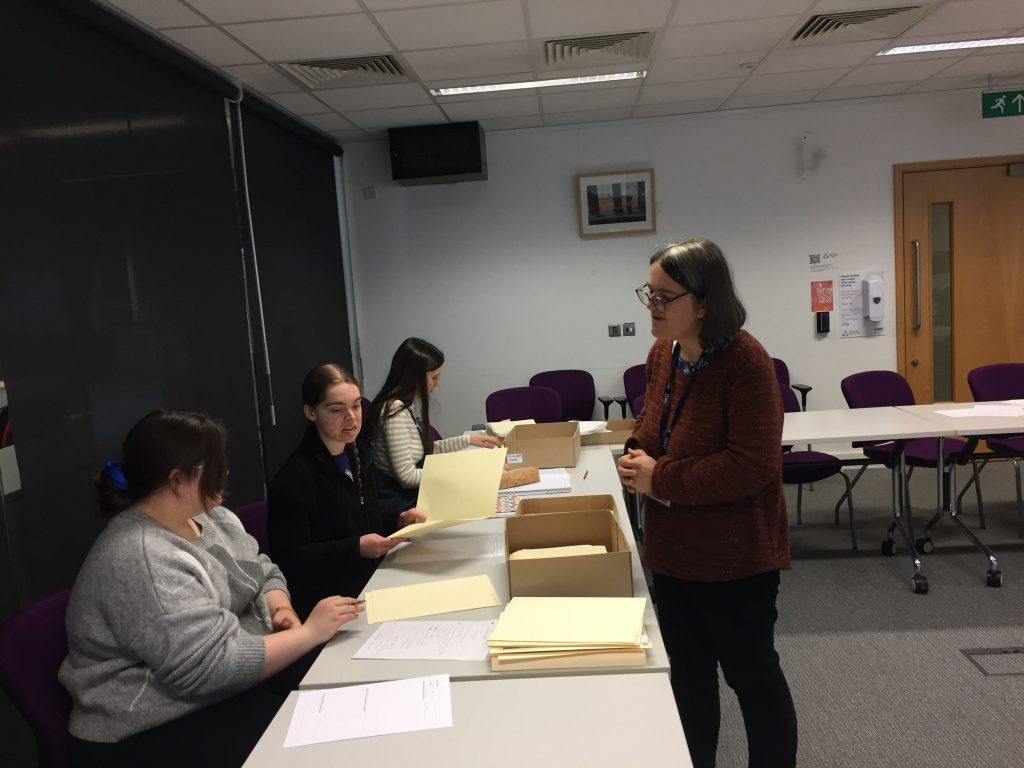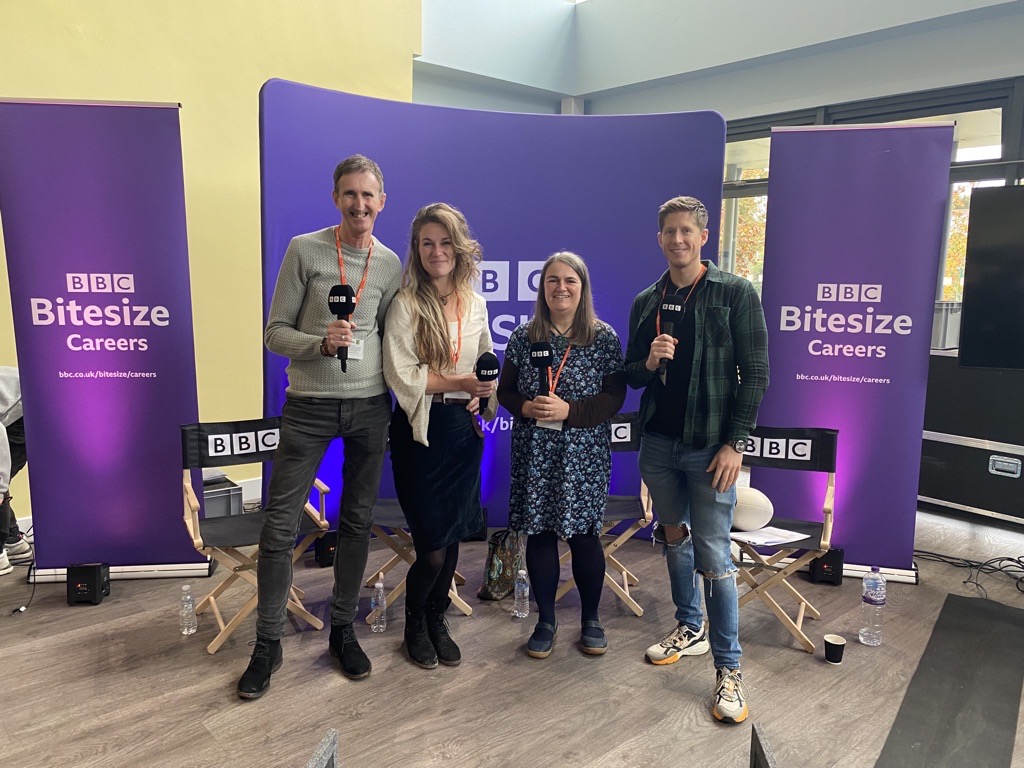Last Friday, I was invited to be a panellist at the BBC Bitesize Roadshow which took place at Barton Court School. The Roadshow is part of a UK-wide tour, visiting 125,000 secondary school students, which aims to inspire young people on their futures. I was asked to speak about academic librarianship as a career path.
The event began with a punchy video outlining some of the careers available at the BBC (and I was pleased to see that librarian took its place alongside researchers, presenters and documentary makers) before a panel of three industry experts were invited to talk about their career journeys, both highs and lows, and provide practical advice to pupils about preparing for the world of work.
I was joined on the stage by Roger Simpson, News Director at BBC News, who has been involved in some of the top breaking news stories of the last few years, such as Brexit, the Covid Pandemic and the announcement of the death of Queen Elizabeth II, as well as Barham-based fashion designer Dulcima Showan, who specialises in creating bespoke wedding dresses from upcycled fabrics, but who has also had a fascinating career as a musician, performing the UK’s Eurovision entry in 2016. I was a little worried librarianship might seem less exciting, but determined to highlight some of the important things that librarians do, which teenagers might not be aware about.
Conscious there has been much debate about the role of libraries in a world of AI, I thought that is was important to stress the contribution that librarians can make to future societies, as I was concerned that teenagers who have grown up in a world of smartphones and easy access to information, might not see the relevance of a role that is essentially hindered by its job title – librarian – defined in the Oxford English Dictionary as “the keeper or custodian of a library”. As I probably spend at least a third of my week teaching and rarely spend time with the print collections, I was keen to debunk that myth.
The host of the roadshow, Ross Fiddes, a rugby league presenter, asked me what sort of things a librarian does on a day to day, so I was able to talk about how I had given a workshop in London to GPs who were studying a module on Advanced Clinical Practice earlier that week. I explained that health librarians have a crucial role in training health practitioners to conduct evidence-based research using medical databases, as it is important that decision-making in the NHS is based on critical engagement with up-to-the minute research. I think the kids could relate to that, having lived through the pandemic. I also highlighted the importance of libraries to humanities-based subject, discussing the role that libraries and archives play in facilitating access to knowledge, by showcasing the work that I do with archive volunteers and work placement students. They were interested to learn we have a letter from Sherlock Holmes author, Sir Arthur Conan Doyle, in our collection.

Working on the Braddon Archive with the MA English Literature students
The panel fielded questions from an enthusiastic audience, who threw a rugby-ball shaped microphone around to capture their questions. These varied from How do you get into your career? and What’s your average day like? to What is more important in life – salary or job satisfaction?
I think my favourite question was What’s your favourite book? as although it sort of negated the emphasis I was making on the whizzy high-tech aspects of librarianship, it grounded me in the roots of my profession – yes, libraries still do have books, even if many of these are digital surrogates, and I would be a liar if I didn’t admit that a love of reading probably attracted me to the profession.
To highlight the importance of personal qualities as well as skill sets, the panel were asked to reflect on those qualities which we felt had helped us to succeed in the workplace and the skills we needed on a day-to-day basis. I said problem-solving and creativity were key attributes, as librarianship is a constantly evolving profession, with technological advancements such as AI providing opportunities rather than challenges. We are really not ready to roll over and let a machine do our work quite yet!
I wanted to stress the value of librarianship today, but also the value of librarianship tomorrow, as I didn’t want to be seen to be directing pupils to a distant past which can no longer be re-created, so I steered clear of comments like “When I started in librarianship, we hadn’t heard of the internet!” I talked about the university’s working groups who are seeking to understand how AI can inform education of the future, about attendance at faculty meetings where we discuss assessment strategies and embedding study skills in the curriculum, and I highlighted the dynamic nature and vibrancy of higher education.
During the day I got to meet almost every year group as well as pupils from Barton Manor and provided some insights into my career.
Helen Foulkes, Head of BBC Education and Newsround described the tour as:
“An opportunity to change a young person’s life by opening their eyes to local careers they may never have thought possible or existed.”
I hope that I did that. The tour team was fantastic and the teachers very welcoming.
You can read more about careers advice for young people at the BBC bitesize website, although curiously, librarian is not listed among them. Tutt, tutt.
But, you can find out more about careers in librarianship on the CILIP careers page.
Photo credit: Phoebe Lomas, BBC
 Library
Library Michelle Crowther
Michelle Crowther 992
992


